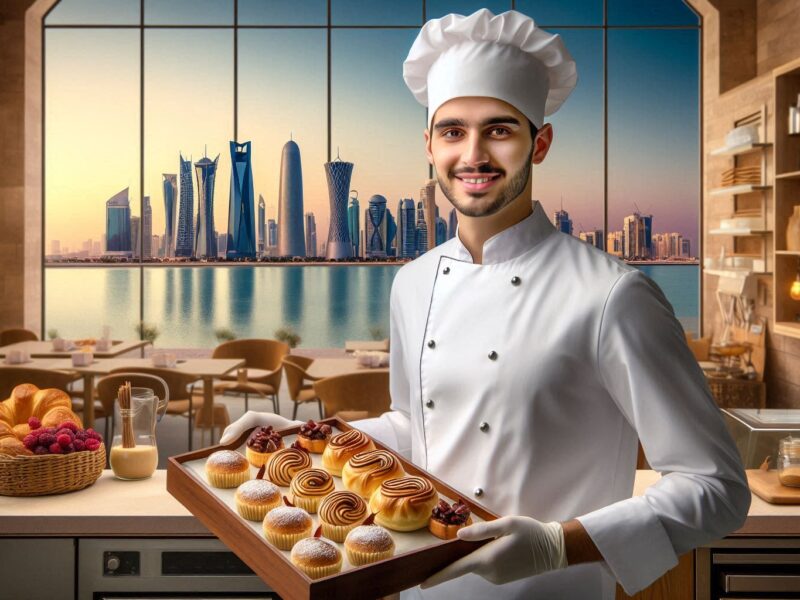Imagine walking into a world where every swirl of ganache, every glossy praline, and every plated dessert is a masterpiece. That’s the kind of world Executive Pastry Chefs create daily. In Doha, where luxury meets culinary sophistication, one brand stands out—Rich Chocolatier. And behind its elegant desserts? A visionary leader who doesn’t just bake, but builds edible art: the Executive Pastry Chef.
About Rich Chocolatier
Rich Chocolatier isn’t just a dessert brand—it’s an experience. Rooted in the art of fine patisserie and luxury chocolate craftsmanship, the brand represents the pinnacle of culinary innovation in Qatar. Known for its handmade chocolates, luxurious desserts, and elegant presentation, Rich Chocolatier has carved out a space where premium quality meets creative indulgence.
Who is an Executive Pastry Chef?
An Executive Pastry Chef isn’t just someone who bakes cakes. They’re the visionary, the strategist, the innovator—the culinary conductor orchestrating the sweet symphony that defines a brand’s identity. Unlike a regular pastry chef, the executive role demands leadership, innovation, and the ability to oversee operations on a macro scale.
Core Responsibilities of the Executive Pastry Chef
Let’s break down what this high-profile role at Rich Chocolatier entails.
Overseeing Production
The Executive Pastry Chef supervises all pastry and chocolate production—ensuring not just quality, but consistency, timing, and efficiency. Whether it’s croissants at dawn or dessert platters at dusk, their eyes are on every detail.
Recipe Creation and Innovation
They aren’t just following recipes—they’re writing them. Developing signature desserts, inventing new techniques, and forecasting pastry trends are all part of the job.
Maintaining Consistency
Every éclair must be perfect, every tart flawless. From texture to taste, the chef ensures every creation reflects the Rich Chocolatier standard.
Staff Training and Mentorship
Leadership is key. The Executive Pastry Chef trains and mentors junior chefs, ensuring the entire team grows together in skill and creativity.
Driving Innovation in Dessert Creation
Creativity is the heartbeat of this role. Whether crafting seasonal menus or designing show-stopping confections, the Executive Pastry Chef must blend tradition with innovation—think saffron-infused truffles or pistachio rose entremets.
Quality Control and Presentation
It’s not just about taste. Presentation matters—because desserts aren’t just eaten; they’re experienced. The Executive Pastry Chef ensures that every detail, from glaze sheen to plating, is immaculate.
Collaborating with the Executive Team
Pastry is part of the bigger picture. The Executive Pastry Chef works closely with brand strategists and operations managers to align culinary offerings with business goals, seasonal campaigns, and customer expectations.
Required Skills and Expertise
To thrive in this position, certain skills aren’t optional—they’re essential.
Culinary Background and Training
Formal education in culinary arts, especially French patisserie and chocolate work, is often the foundation. But what elevates a candidate is how they translate training into unique culinary expressions.
Mastery of Chocolate and Modern Techniques
From tempering to sculpting, the Executive Pastry Chef must have elite chocolate skills. Knowledge of modern techniques—like molecular gastronomy or sous-vide pastry—adds a cutting-edge twist.
Leadership and Communication
An Executive Pastry Chef is both a creator and a communicator. They must lead with clarity, motivate under pressure, and build a team that thrives in high-stakes environments.
Organization and Cost Efficiency
Behind every luxurious dessert is a well-oiled system. Managing ingredient costs, optimizing kitchen workflows, and reducing waste are as important as the dessert itself.
Experience Requirements
With 6 to 10 years in high-end patisserie, candidates bring more than just experience—they bring stories, lessons, and finesse. This time spent honing their craft in luxury hotels, fine-dining restaurants, or elite patisseries defines their edge.
Why Doha? The Culinary Renaissance in Qatar
Qatar’s capital, Doha, is emerging as a global culinary hotspot. With international chefs setting up shop and local talent rising, the city offers an exciting canvas for pastry artists. Working here means being at the forefront of gastronomic evolution in the Middle East.
What Rich Chocolatier Offers
Joining Rich Chocolatier isn’t just a job—it’s a career milestone.
-
Competitive Salary & Perks: Rewards reflect talent and responsibility.
-
Creative Freedom: The kitchen is your canvas.
-
Growth Opportunities: As the brand expands, so do leadership and innovation roles.
Challenges Faced by Executive Pastry Chefs
It’s not all sugar and ganache. Executive Pastry Chefs must balance creativity with constraints—tight deadlines, budget limits, and high expectations. It takes resilience and adaptability to excel in such a dynamic role.
Pathway to Becoming an Executive Pastry Chef
Start with a Culinary Education
A strong foundation in culinary arts—especially from institutes focused on pastry or chocolate—is crucial.
Climb the Ranks
Begin as a commis pastry chef. Learn the ropes. Move up to chef de partie, then sous chef, and finally, take the leap into executive leadership.
Never Stop Learning
Attend workshops, travel, experiment. The world of pastry is always evolving, and the best chefs evolve with it.
Conclusion
Being an Executive Pastry Chef at Rich Chocolatier is more than a profession—it’s a calling. It demands mastery, vision, and the courage to innovate. For those who dream in layers of mousse, think in textures, and speak the language of chocolate, this role in Doha is the golden ticket.
FAQs
1. What sets an Executive Pastry Chef apart from a regular chef?
Executive Pastry Chefs lead operations, innovate recipes, and manage teams—far beyond the scope of day-to-day baking.
2. How important is chocolate expertise for this role?
It’s essential. Rich Chocolatier places a premium on fine chocolate work, so deep knowledge and hands-on experience are a must.
3. Can creativity outweigh formal training in pastry arts?
While creativity is vital, formal training builds the techniques that make creative visions possible. Ideally, both are needed.
4. What does a typical day look like for an Executive Pastry Chef?
From morning briefings to quality checks, recipe testing, team coaching, and product planning—every day is packed with action and artistry.
5. Is working in Doha different from other culinary markets?
Yes. Doha combines luxury standards with a multicultural palate, offering unique opportunities and challenges for culinary professionals.


Comments